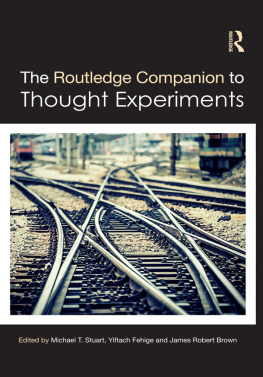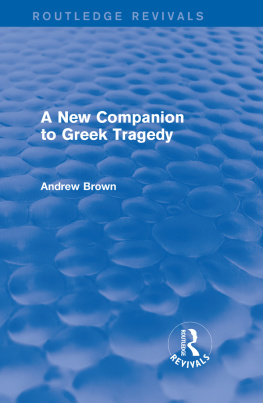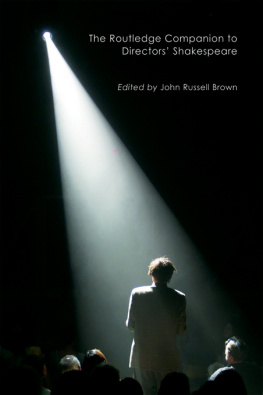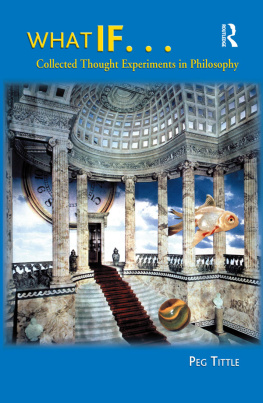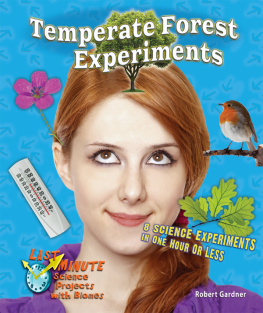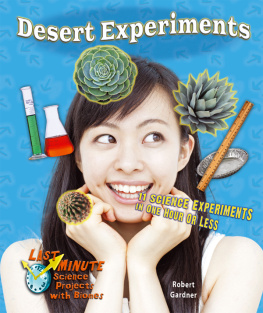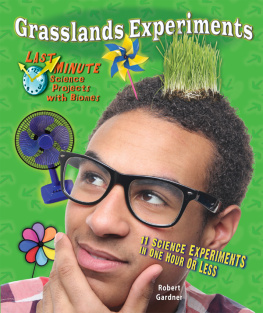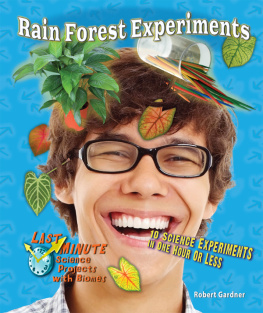Brown James Robert - The Routledge Companion to Thought Experiments
Here you can read online Brown James Robert - The Routledge Companion to Thought Experiments full text of the book (entire story) in english for free. Download pdf and epub, get meaning, cover and reviews about this ebook. City: London;[England];New York, year: 2018, publisher: Taylor and Francis;Routledge, genre: Science. Description of the work, (preface) as well as reviews are available. Best literature library LitArk.com created for fans of good reading and offers a wide selection of genres:
Romance novel
Science fiction
Adventure
Detective
Science
History
Home and family
Prose
Art
Politics
Computer
Non-fiction
Religion
Business
Children
Humor
Choose a favorite category and find really read worthwhile books. Enjoy immersion in the world of imagination, feel the emotions of the characters or learn something new for yourself, make an fascinating discovery.
- Book:The Routledge Companion to Thought Experiments
- Author:
- Publisher:Taylor and Francis;Routledge
- Genre:
- Year:2018
- City:London;[England];New York
- Rating:3 / 5
- Favourites:Add to favourites
- Your mark:
- 60
- 1
- 2
- 3
- 4
- 5
The Routledge Companion to Thought Experiments: summary, description and annotation
We offer to read an annotation, description, summary or preface (depends on what the author of the book "The Routledge Companion to Thought Experiments" wrote himself). If you haven't found the necessary information about the book — write in the comments, we will try to find it.
The Routledge Companion to Thought Experiments — read online for free the complete book (whole text) full work
Below is the text of the book, divided by pages. System saving the place of the last page read, allows you to conveniently read the book "The Routledge Companion to Thought Experiments" online for free, without having to search again every time where you left off. Put a bookmark, and you can go to the page where you finished reading at any time.
Font size:
Interval:
Bookmark:
First published in 2018
by Routledge
2 Park Square, Milton Park, Abingdon, Oxon OX14 4RN
and by Routledge
711 Third Avenue, New York, NY 10017
Routledge is an imprint of the Taylor & Francis Group, an informa business
2018 selection and editorial matter, Michael T. Stuart, Yiftach Fehige and James Robert Brown; individual chapters, the contributors
The right of Michael T. Stuart, Yiftach Fehige and James Robert Brown to be identified the authors of the editorial material, and of the authors for their individual chapters, has been asserted by them in accordance with sections 77 and 78 of the Copyright, Designs and Patents Act 1988.
All rights reserved. No part of this book may be reprinted or reproduced or utilised in any form or by any electronic, mechanical, or other means, now known or hereafter invented, including photocopying and recording, or in any information storage or retrieval system, without permission in writing from the publishers.
Trademark notice: Product or corporate names may be trademarks or registered trademarks, and are used only for identification and explanation without intent to infringe.
British Library Cataloguing-in-Publication Data
A catalogue record for this book is available from the British Library
Library of Congress Cataloging-in-Publication Data
A catalog record for this book has been requested
ISBN: 978-0-415-73508-7 (hbk)
ISBN: 978-1-315-17502-7 (ebk)
Typeset in Goudy
by Book Now Ltd, London

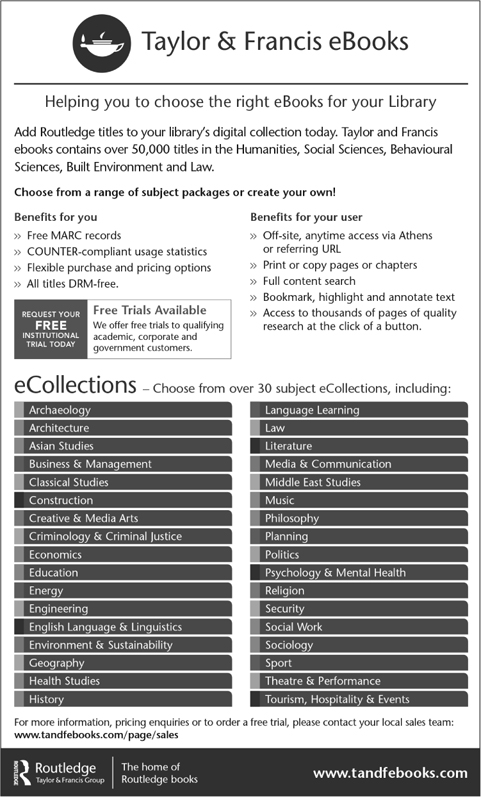
Richard T. W. Arthur is a professor of Philosophy at McMaster University. He specializes in early-modern natural philosophy and mathematics, with special attention to Leibniz, Newton and Descartes. His research interests also include the theory of time, the infinite and the epistemology of science, especially thought experiments. He has a book manuscript on Leibnizs theory of substance on the verge of publication and he is currently finishing a book defending the reality of becoming in modern physics. Books include G. W. Leibniz: The Labyrinth of the Continuum (2001), Leibniz (2014) and Introduction to Logic (2017).
Alexander Becker is Professor of Philosophy at the University of Marburg. His interests include philosophy of language, metaphysics, ancient philosophy and aesthetics. On Plato, he has published an introduction to the Theaetetus (2008). An introduction to the Republic is forthcoming (2017).
Alisa Bokulich is Professor of Philosophy at Boston University and Director of the Center for Philosophy and History of Science, where she organizes the Boston Colloquium for Philosophy of Science. She is an associate member of Harvard Universitys History of Science Department and a Series Editor for Boston Studies in the Philosophy and History of Science . She is author of Reexamining the Quantum-Classical Relation: Beyond Reductionism and Pluralism , and her research focuses on scientific models and explanations in the physical sciences, including, more recently, the geosciences.
Elke Brendel is a professor of Philosophy at the University of Bonn, Germany. She has published numerous books and articles on topics in logic, epistemology, philosophy of language, and meta-philosophy. Besides her interest in thought experiments, she has mainly worked on logical and semantic paradoxes, theories of truth and knowledge, epistemic contextualism and relativism, and the semantics of disagreement.
James Robert Brown is a professor of Philosophy at the University of Toronto. His interests include thought experiments, foundational issues in mathematics and physics, visual reasoning, and issues involving science and society, such as the role of commercialization in medical research. His books include The Rational and the Social (1989), The Laboratory of the Mind: Thought Experiments in the Natural Sciences (1991/2010), Smoke and Mirrors: How Science Reflects Reality (1994), Philosophy of Mathematics: An Introduction to the World of Proofs and Pictures (1999/2008), Who Rules in Science: A Guide to the Wars (2001), Platonism, Naturalism and Mathematical Knowledge (2012) and others.
Georg Brun is a research fellow in philosophy at the University of Bern. He has a special interest in methodological issues, particularly in epistemology, argumentation theory, philosophy of logic and metaethics. He is the author of The Right Formula: Problems of Logical Formalization (2004 in German) and co-editor of Epistemology and Emotions (2008).
Marco Buzzoni is Professor of Philosophy of Science at the University of Macerata and Co-editor of Epistemologia, a special issue of Axiomathes . His main fields of research include Poppers and Kuhns philosophy of science, science and technology, epistemology and methodology of human and social sciences, thought experiment in the natural sciences, and philosophy of biology. He is the author of Thought Experiment in the Natural Sciences (2008).
Daniel Cohnitz is Professor of Theoretical Philosophy at Utrecht University. He is the author of Gedankenexperimente in der Philosophie (2006) and numerous articles on thought experiments and other topics in theoretical philosophy. His current research focuses on metaphilosophy, philosophy of language and logic, and epistemology.
Klaus Corcilius is Associate Professor of Philosophy at the University of California, Berkeley. His primary interest is ancient philosophy, theoretical and practical, and especially Aristotle. Currently, he is working on Aristotles scientific conception of the soul and human and animal agency. He is co-editor of Partitioning of the Soul in Ancient, Medieval and Early Modern Philosophy (2014).
David Davies is Professor of Philosophy at McGill University. He is the author of Art as Performance (2004), Aesthetics and Literature (2007) and Philosophy of the Performing Arts (Wiley-Blackwell 2011), and editor/co-editor of The Thin Red Line (2008) and Blade Runner (2015). He has published widely on philosophical issues relating to film, photography, performance, music, literature, and visual art and also on issues in metaphysics, philosophy of mind and philosophy of language.
Yiftach Fehige is Associate Professor of Philosophy at the University of Toronto. His appointment is for the interdisciplinary field of Christianity and science. The Institute for the History and Philosophy of Science and Technology is his academic home. He has published widely in the major journals in his field. Among the most recent publications is an edited volume on science and religion as it relates to the encounter between East and West (Routledge 2016).
Mlanie Frappier is Assistant Professor of Humanities at the University of Kings College, Halifax, Canada. She works on the role of thought experiments in physics and has co-edited Thought Experiments in Science, Philosophy, and the Arts with Letitia Meynell and James R. Brown.
Marcus Giaquinto is Emeritus Professor of Philosophy at University College London. His research falls mostly in philosophy of mathematics. He is the author of two books, The Search for Certainty: A Philosophical Account of Foundations of Mathematics (2002) and Visual Thinking in Mathematics: An Epistemological Study (2007). He is currently working on the philosophy of number with attention to relevant findings in the cognitive sciences.
Jean-Yves Goffi is Professor Emeritus at the Universit Grenoble-Alpes. He has published in applied ethics, philosophy of technology and history of philosophy. He is currently working on the transhumanist movement and its relation to utopian thought.
Next pageFont size:
Interval:
Bookmark:
Similar books «The Routledge Companion to Thought Experiments»
Look at similar books to The Routledge Companion to Thought Experiments. We have selected literature similar in name and meaning in the hope of providing readers with more options to find new, interesting, not yet read works.
Discussion, reviews of the book The Routledge Companion to Thought Experiments and just readers' own opinions. Leave your comments, write what you think about the work, its meaning or the main characters. Specify what exactly you liked and what you didn't like, and why you think so.

